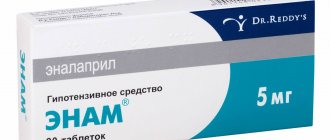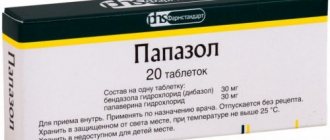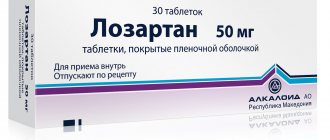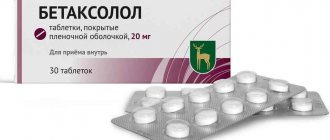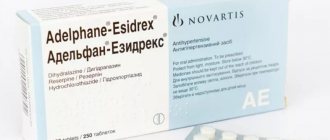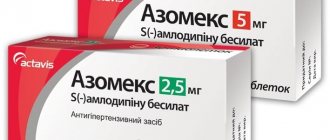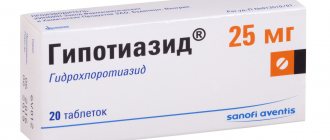Brief information about the drug
Normodipine is a blood pressure drug that belongs to the pharmacological group of calcium channel blockers. Produced by the Hungarian company Gedeon Richter.
Release form
The blood pressure medicine Normodipin is presented on the modern pharmaceutical market in tablet form, which is most convenient for use at home. The drug is sold in packages containing 10 blisters (10 tablets each).
Composition of the medicine
The main active component of the drug is amlodipine, presented in dosages of 3 mg or 10 mg. In addition, the tablets contain excipients: microcellulose, magnesium stearate, sodium carboxymethyl starch, anhydrous calcium hydrogen phosphate.
pharmachologic effect
The blood pressure drug Normodipin has a pronounced antianginal and hypotensive effect aimed at reducing blood pressure.
Normodipin tablets
Terms and storage mode
The maximum shelf life of the drug is 3 years. It is necessary to store the tablets at a temperature not exceeding +30C, in a place inaccessible to children and pets.
Conditions for dispensing from a pharmacy
You can purchase the drug in pharmacy chains only if you have an appropriate medical prescription.
Cost of tablets
The exact price of the drug depends on the dose of the main active ingredient and the number of tablets in the package. The approximate cost of Normodipin varies from 360 to 750 rubles.
Normodipine price, where to buy
The price of Normodipin is:
• 10 mg No. 30 – 695-760 rubles; • 5 mg No. 30 – 360-410 rubles.
- Online pharmacies in RussiaRussia
- Online pharmacies in UkraineUkraine
- Online pharmacies in KazakhstanKazakhstan
ZdravCity
- Normodipin tablets 5 mg 30 pcs. JSC Gedeon Richter
RUB 298 order - Normodipin tablets 10 mg 30 pcs. JSC Gedeon Richter
RUR 586 order
Pharmacy Dialogue
- Normodipin (tablet 5 mg No. 30) Gedeon-Richter
RUB 342 order
- Normodipin (tab. 10 mg No. 30) Gedeon-Richter
RUR 622 order
show more
Pharmacy24
- Normodipin 10 mg No. 30 tablets VAT "Gedeon Richter", Ugorshchina
366 UAH. order - Normodipin 5 mg No. 30 tablets VAT "Gedeon Richter", Ugorshchina
179 UAH. order
PaniPharmacy
- Normodipin tablets Normodipin tablets. 10 mg No. 30 Hungary, Gedeon Richter
365 UAH. order
- Normodipin tablets Normodipin tablets. 5mg No. 30 Hungary, Gedeon Richter
186 UAH order
show more
Pharmacodynamics: how it affects blood pressure
Blood pressure tablets Normodipin slow down the transport of calcium through cardiomyocytes (muscular cellular structures of the heart and blood vessels). Due to the drug's ability to reduce the level of precardiac load and the tone of arterial smooth muscles, Normodipine lowers blood pressure.
The tablets have a good effect against ischemia, reducing the likelihood of developing angina attacks.
The antianginal effect of Normodipin lies in its ability to dilate coronary and peripheral blood vessels (including in cases of atherosclerosis). Reduces the degree of load on the myocardium and its need for oxygen.
The drug belongs to the group of calcium channel blockers
Release form and composition
Dosage forms of Normodipin:
- Tablets: oblong-rounded, biconvex, white or almost white, on one side with an engraving “5” (10 pieces in an Al/PVC blister, 3 blisters in a cardboard pack);
- Tablets: oblong-rounded, biconvex, white or almost white, with “10” engraved on one side and a line on the other (10 pieces in an Al/PVC blister, 3 blisters in a cardboard pack).
Composition of 1 tablet:
- Active substance: amlodipine – 5 and 10 mg (which is equivalent to amlodipine besylate in the amount of 6.944 and 13.889 mg, respectively);
- Additional components: magnesium stearate, sodium carboxymethyl starch (type A), anhydrous calcium hydrogen phosphate, microcrystalline cellulose.
Pharmacokinetics
The bioavailability of the drug is about 70-80%. The medication is absorbed through the gastrointestinal tract. Once in the liver area, it is transformed into inactive metabolites.
Normodipine reduces blood pressure within 6-7 hours from the moment of taking the tablets. The maximum concentration of the drug components in the user’s blood is observed after half a day.
The drug is eliminated from the body using the renal apparatus over a period of 35 to 50 hours.
What is Normodipin used for?
Cardiologists and general practitioners recommend drinking Normodipin for high blood pressure in patients who have the following indications for use:
- Arterial hypertension;
- Angina pectoris;
- Hypertonic disease;
- Prinzmetal's angina
The drug is also prescribed for angina pectoris occurring in a vasospastic form. It can be used as an independent medicine or as one of the components of complex therapy.
Pharmacological properties
Pharmacodynamics
Being a slow calcium channel blocker, a dihydropyridine derivative, the active component of Normodipine, amlodipine, has an antianginal and hypotensive effect. By binding to the S6 segments of the III and IV domains of the α1 subunit of the L-type calcium channel, amlodipine blocks calcium channels, reducing the transmembrane transition of calcium ions into the cell (mainly into vascular smooth muscle cells, to a lesser extent into cardiomyocytes).
The antianginal effectiveness of Normodipin is ensured by the expansion of peripheral arteries and arterioles, as well as coronary arteries: in patients with angina pectoris, the severity of coronary heart disease (CHD) decreases; with the expansion of peripheral arterioles, the total peripheral vascular resistance (TPVR) decreases, the preload on the heart decreases, and the oxygen demand of the heart muscle decreases. Due to the expansion of the coronary arteries and arterioles in ischemic and unchanged areas of the myocardium, the flow of oxygen into the heart muscle increases (especially in patients with vasospastic angina); the development of spasm of the coronary arteries is prevented (including in smokers). For patients with stable angina, taking a single daily dose increases tolerance to physical activity, slows down the development of ischemic depression of the ST segment and angina; reduces the frequency of angina attacks, reducing the need for nitroglycerin and other nitrates.
Amlodipine has a long-lasting, dose-dependent hypotensive effect; its hypotensive effect is determined by a direct vasodilating effect on vascular smooth muscle tissue. In patients with arterial hypertension, taking a single dose of Normodipine provides a clinically significant drop in blood pressure, with the patient lying and standing, for 24 hours.
Orthostatic hypotension due to the use of amlodipine is extremely rare. It does not cause a decrease in exercise tolerance and left ventricular ejection fraction, reduces the level of left ventricular myocardial hypertrophy, does not affect myocardial conductivity and contractility, does not cause a reflex increase in heart rate (HR), inhibits platelet aggregation, increases glomerular filtration rate and has weak natriuretic effect. In patients with diabetic nephropathy, the severity of microalbuminuria does not increase. Amlodipine does not have a negative effect on metabolism and lipid levels in the blood plasma and can be used in the treatment of patients with bronchial asthma, gout and diabetes mellitus.
The effect of taking amlodipine occurs after 2–4 hours and lasts 24 hours.
Pharmacokinetics
- absorption: when administered orally, the substance is absorbed from the gastrointestinal tract slowly and almost completely; food intake does not affect its absorption. In blood plasma it reaches Cmax (maximum concentration) after 6–12 hours, regardless of the patient’s age. Css (saturation stage) in plasma occurs after 7–14 days of administration; bioavailability of the substance – 63–80%;
- distribution in organs and tissues: Vd (volume of distribution) is 21 l/kg, which is an indicator of the predominant distribution in tissues. Up to 97% of amlodipine is bound to plasma proteins. The substance penetrates the BBB (blood-brain barrier), as well as into breast milk;
- metabolism: up to 90% of amlodipine is biotransformed in the liver, forming inactive metabolites;
- excretion: up to 10% of amlodipine is excreted in the urine unchanged and up to 60% in the form of metabolites; with feces in the form of metabolites – 20–25%. Elimination is biphasic, the average T1/2 (half-life) is 35–50 hours. The total clearance of the substance is 7 ml/min/kg. During hemodialysis, amlodipine is not excreted.
In elderly patients over 65 years of age and patients with moderate and severe chronic heart failure, the clearance of amlodipine decreases with a subsequent increase in AUC (area under the concentration-time curve) by 40–60%, which requires the administration of reduced initial doses of Normodipine. A similar decrease in AUC is observed due to liver dysfunction.
Renal failure does not have a significant effect on the pharmacokinetics of amlodipine.
For whom is it contraindicated?
Medical specialists categorically prohibit patients from taking Normodipin with high blood pressure if they have the following clinical contraindications:
- Aortic stenosis;
- Hypotonic disease (low blood pressure);
- Individual intolerance and hypersensitivity to the components contained in the tablets;
- Shock state of cardiogenic nature;
- Angina pectoris occurring in an unstable form;
- Collapse.
The drug is not used to treat women expecting the birth of a baby, breastfeeding mothers, as well as children under the age of majority.
With particular caution, Normodipin for hypertension is prescribed to patients with diagnosed cardiomyopathy, sinus node weakness, liver dysfunction, heart failure occurring in the stage of decompensation, acute myocardial infarction, mitral stenosis.
Normodipine is contraindicated for pregnant women.
Contraindications
The drug is not recommended for use in:
- severe arterial hypotension - with systolic blood pressure ≤ 90 mmHg;
- cardiogenic shock;
- collapse;
- unstable angina ;
- aortic stenosis;
- during pregnancy and lactation ;
- age category up to 18 years;
- hypersensitivity to amlodipine and other components of the drug.
This drug is prescribed with caution for mitral stenosis and cardiomyopathies .
Instructions for use and dosage
Instructions for use of Normodipin recommend drinking the tablets as a whole, without crushing or chewing.
The recommended starting dose of the drug is 5 mg per day. If necessary, the daily dosage of tablets can be doubled to 10 mg.
Despite the fact that the drug does not cause withdrawal symptoms, it is recommended to complete treatment smoothly, gradually reducing the dose of Normodipine.
The duration of the therapeutic course is set by the doctor individually, depending on the exact diagnosis, the stage of the pathological process, the age and health of the patient, and the reaction of his body to the proposed treatment.
special instructions
Treatment with Normodipine should be accompanied by monitoring body weight and sodium , including prescribing an appropriate diet . In addition, to prevent pain , bleeding , and gum hyperplasia, careful maintenance of dental hygiene and regular visits to the dentist are recommended.
Patients with low body weight, short stature or impaired liver function require an individual dosage calculation in the direction of reduction.
Possible side effects
When taking Normodipine for high blood pressure, you must remember that the tablets can cause the following adverse reactions:
- Irregular heart rhythm (arrhythmia);
- Excessive decrease in blood pressure;
- Dyspnea;
- Cough syndrome;
- Increased or slowed heart rate;
- Vasculitis;
- Erectile dysfunction in representatives of the stronger sex;
- Rhinitis;
- Nausea and vomiting;
- Stool disorders (diarrhea followed by constipation);
- Feeling of dryness in the mouth;
- Paresthesia of the arms and legs;
- Headache;
- Fainting;
- Hives;
- Skin itching;
- Dermatitis;
- Deterioration of visual function;
- Dyspeptic disorders;
- Attacks of dizziness;
- Tremor;
- Excessive sleepiness;
- Gastritis;
- Frequent urge to urinate;
- Thrombocytopenia (decreased blood clotting rates);
- Hair loss;
- Convulsive syndrome;
- Joint and muscle pain;
- Hyperglycemia;
- Myalgia.
Any adverse reactions that occur while taking the drug must be reported to your doctor! You may need to reduce the dosage or replace the drug with a more suitable analogue!
While taking Normodipin, vision may deteriorate
Side effects of the drug Normodipin
Headache, swelling, increased fatigue, drowsiness, nausea, abdominal pain, flushing of the facial skin, tachycardia and dizziness are noted. Rarely - intestinal dysfunction, arthralgia, asthenia, shortness of breath, dyspepsia, gingival hyperplasia, gynecomastia, impotence, frequent urination, mood lability, myalgia, itchy skin, rash, blurred vision. Extremely rarely - polymorphic erythema, jaundice, changes in the activity of liver enzymes, caused in most cases by cholestasis.
Overdose of a drug
The use of Normodipin tablets in increased dosages provokes the following alarming symptoms:
- A sharp and severe decrease in blood pressure;
- Development of hypotensive crisis;
- Rapid heartbeat (tachycardia);
- Peripheral vasodilation.
An overdose threatens the patient with going into a state of shock and even death. Therefore, at the first characteristic signs, it is necessary to call doctors, and before the specialists arrive, give the victim a gastric lavage, give a portion of sorbents, and lay him down, raising his legs above head level.
For further treatment, vasoconstrictor drugs are used, droppers or intravenous injections of calcium gluconate are given.
Overdose of the drug Normodipin, symptoms and treatment
Data is limited. Given the slow absorption of the drug, it is advisable to rinse the stomach. A significant overdose can lead to pronounced peripheral vasodilation with a significant and prolonged decrease in blood pressure. Clinically significant arterial hypotension caused by an overdose of amlodipine requires urgent measures aimed at maintaining the function of the cardiovascular and respiratory systems, including monitoring vital signs, elevated position of the lower extremities, replenishment of blood volume and diuresis control, and, if necessary, symptomatic treatment. To restore vascular tone and increase blood pressure, vasoconstrictor drugs can be used if there are no contraindications to their use. To eliminate the blockade of calcium channels, intravenous administration of calcium gluconate is indicated. Since amlodipine is highly bound to plasma proteins, dialysis is ineffective.
Interaction with other drugs
Combination with antiarrhythmic drugs enhances the negative inotropic effect.
The simultaneous use of tablets with adrenergic blockers, diuretics, and ACE inhibitors greatly enhances the antihypertensive effect of Normodipine and can cause the development of a hypotensive crisis.
Antiviral medications, on the contrary, reduce the effectiveness of this drug.
Normodipine combines well with nonsteroidal anti-inflammatory drugs, hypoglycemic, antianginal and antibacterial medications.
You should consult your doctor about the combination of Normodipine with other drugs.
How to replace Normodipin
On the modern pharmaceutical market you can find and purchase the following analogues of Normodipine:
- Nimodipine;
- Emlodin;
- Lacipil;
- Amlodipine;
- Azomex;
- Amlong;
- Cordafen.
The drugs listed above have similar effects and indications, but they have their own specifics in terms of dosage, dosage regimen, and contraindications. For this reason, it is strictly not recommended to independently replace Normodipin tablets prescribed by a doctor with one of the possible analogues. If there is a need to replace the drug, you should consult on this topic with a qualified specialist who will help you choose the best option and tell you about the features of its use!
Normodipine for high blood pressure is an effective antihypertensive drug that is successfully used to treat not only hypertension, but also angina. Since the tablets have a fairly wide range of contraindications and possible adverse reactions, they can only be taken as prescribed by a qualified specialist, strictly adhering to the dosage of the medicine recommended by the doctor and the positive effects of the therapy!
Reviews about Normodipine
This drug is used by many hypertensive patients and patients with heart pathologies . Both positive and negative statements can be found about the effectiveness of treatment with Normodipin. The situation most often discussed on forums is that this antihypertensive drug initially has a noticeable effect, but subsequently stops normalizing blood pressure.
Doctors' reviews of Normodipine are positive and they often include it in the treatment regimen, but it is not advisable to use this medicine on your own. Regarding drug replacement, it is recommended to consult with your doctor, and not on the Internet.
